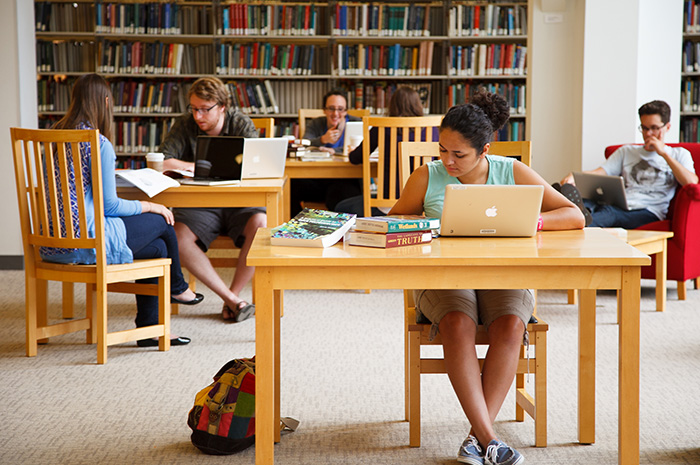Digital-Age Scholarship

Photo by Carl Socolow '77.
Dickinson Scholar celebrates a booming inaugural year
by MaryAlice Bitts-Jackson
If you haven’t visited Dickinson Scholar lately, you haven’t visited Dickinson Scholar. Since its launch in 2014, the college’s ever-expanding digital collection of scholarly and creative work has grown from 64 items to 395 articles, theses and other scholarly works and counting, and the site has seen 28,000 page views and more than 10,000 downloads during the past 15 months.
“What this tells us is that once researchers, through whatever search tool or strategy they have used, arrive at a Dickinson Scholar page that includes a full-text article or thesis, they are likely to download that item for their personal use more than 1/3 of the time,” says College Archivist Jim Gerencser '93, who spearheaded the project. “In other words, there tends to be much less browsing and window shopping than is typical with online sources.”
An impressive start
Dickinson Scholar showcases faculty papers, honors theses, other student scholarship and creative works. Half of the site’s 395 articles are available for full-text downloads, and many of the remaining articles are simply embargoed until permissions are received from the publishers.
The most frequently downloaded papers span the full range of the Dickinson liberal-arts curriculum, from medieval studies to nanoscience, language to math, environmental studies to poly sci. Currently, the collection includes research in architecture (3 works), arts/humanities (335), business (2), education (7), engineering (1), law (5), life science (25), medicine/health science (12), physical science/mathematics (37) and social/behavioral science (93). New website features include a map on the homepage showing the location from which users have downloaded articles within the past week and a scrollable visualization of some of the works represented in the collection.
At the time of this writing, early adopters Karl Qualls, professor of history, and Stephen Erfle, associate professor of international business & management, have the most uploaded articles (13 and 12, respectively), and Qualls’ paper on Western influence on the Russian revolutions is the most-downloaded faculty paper overall. Emily Bowie ’14’s research on natural deworming methods for sheep remains one of the most-downloaded (full-text) papers on the site (based on number of downloads per day, since each paper was added to the collection), second only to Associate Director of Library Resources Theresa Arndt’s description of how the Waidner-Spahr Library staff altered its service model to suit the community’s evolving needs. Former women’s & gender studies major Sara Raab ’13’s study of gender-power dynamics in BDSM rounds out the top three.
Recent additions include Professor of Mathematics Lorelei Koss' 2014 article, “Examples of Parametrized Families of Elliptic Functions with Empty Fatou Sets;” Assistant Professor of Environmental Studies Heather Bedi’s 2013 article, “Special Economic Zones: National Land Challenges, Localized Protest;” and a study of patient satisfaction at the Sadler Health Center (Carlisle, Pa.), conducted by former health-studies students Jonathan Nieves, Marleni Milla, Alison Riehm and Molly Foltzer, each of the class of 2011.
Looking ahead
The Dickinson Scholar team is currently exploring ways to share works within a journal format, and has already digitized The Collegian, a student-authored publication from 1849, the earliest literary magazine known to have been produced solely by Dickinson undergraduates, and 16 issues of John and Mary’s Journal (1975-2003), a publication of the Friends of the Library that included articles by Dickinson College faculty and other scholars, says Gerencser. Once all technical issues have been worked through, the team will look into sharing these digitized publications and adding other student-authored publications—such as The Hornbook and Belles Lettres Revue—to the queue.
Library staff, meanwhile, are hard at work securing permissions to share published articles, senior theses and other exceptional student, faculty and staff work from the 2014-15 academic year.
That includes creative work—including art exhibition catalogs and digital representations of artwork, and results from community-based empirical research projects. To date, library staff have uploaded 29 fine-art and art-history exhibition catalogs, dating back to 2004 and 1998, respectively. Collectively, the catalogs have already been downloaded 320 times. The first video to be added to the collection is “Cumberlocal,” a short piece by Multimedia Specialist Brenda Landis that secured first place in the Carlisle Film Festival last February.
Learn more
- Dickinson Scholar
- “Sharing Scholarship”
- Archives & Special Collections
- Research at Dickinson
- Latest News
Published June 10, 2015